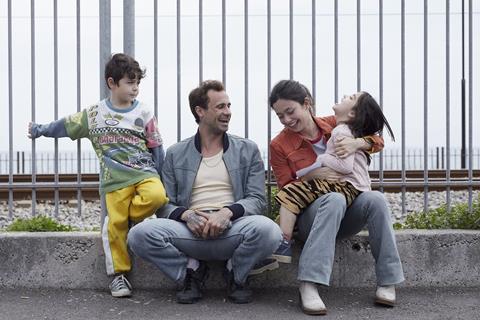Ana Castillo soars in Jaime Rosales’ drama about a young mother bouncing around a tough man’s world

Dir: Jaime Rosales. Spain/France. 2022. 107 mins.
This three-part tale of one young woman’s against-the-odds struggle to form a family may be an oft-told one, but it’s played with a remarkable attention to emotional truthfulness, embodied primarily in a captivating, sometimes wrenching, and always relatable central performance by Ana Castillo. Spanish auteur Jaime Rosales’ seventh feature, which plays in San Sebastian’s official selection, sees him take a character rather than an idea as his starting point, which will come as a relief to viewers who have struggled with the demands of some of his earlier work. Although this new accessibility is unlikely to make Rosales’ name familiar beyond the festival circuit which is his natural home, Wild Flowers—an entirely different work from his last film, Petra—does signal an interesting step towards the mainstream.
An interesting step towards the mainstream
It’s a tough gig being Julia (Ana Castillo, who brings that special knack of utter naturalness to every role she plays). She wants to be a nurse, but is scratching around for temp jobs at the same time as trying to raise kids and establish a family structure for them. If possible, though it may be too much to ask for, she’d also like to retain a little independence.
Julia lives with her father Roberto (Manolo Solo), having separated from Marcos (Quim Avila), a soldier posted to the Spanish enclave of Melilla. She begins a relationship with tightly-strung Oscar (Oriol Pla), muscular of body and deranged of gaze: unlike Julia, everyone in the audience can see him coming a mile off. Sure enough, having moved them all into a flat he can’t afford, Oscar—who, despite the stereotype, Pla nuances well—is soon getting a tattoo of Julia’s name, fighting with the kids over the remote control, and verbally abusing one of Julia’s old school friends, Alex (Lluis Marques) in one of the marvellously authentic and intense scenes that pepper the film.
Things seem to be taking a turn towards the domestic abuse drama when suddenly we get one of those ellipses that are Rosales’ hallmark. Franky implausibly—he’s doesn’t really seem like the kind of chap to let things go and move on—Oscar disappears from both the film and from Julia’s life. She takes the kids down to Melilla to give things a second go with Marcos, a different kind of man as we can see when we witness him delicately ironing a shirt to the accompaniment of opera.
The key scene during this second section has the well-intentioned but slightly useless Marcos, to the absolute anguish of both parents, losing their daughter during a game of hide and see. Rosales adds another ellipsis here, as we realise that the script has chosen to be less interested in showing the narrative consequences of events, otherwise known as plot, than in the effects of them on people, otherwise known as character. It can be disorienting, but it works.
Meanwhile, Alex is still around —a potential third chance, waiting in the wings for Julia: another boyfriend, another house move. Things start to drag a little through this third movement, but it slowly mounts to a wonderfully understated conclusion, one that’s quietly empowering in a film that could so easily have been miserabilist.
In much of Rosales’ previous work, the self-conscious stylishness has often created a distance between the characters and the audience, the longueurs, for example, generously giving the critics time to select their adjectives while around them people quietly nod off. No such danger here, with the pacing generally swift.
Rosales and director of photography Helene Louvart save the eye-catching camerawork for certain key moments, as for example when Oscar talks directly into camera to us as well as to Julia: the effect is scary. A lengthy but wonderfully executed dance scene is likewise dropped in (not entirely originally, dance throughout Wild Flowers is an index of joyous bonding).
In any case, Castillo’s outstanding performance of a superbly written role makes any such distance impossible. Under the impact of these various relationships, the resilient Julia’s journey to maturity, through a terrain strewn with emotional obstacles, is replete with not only suffering, but also joy—for a Rosales film, and for a film on this subject, there is much quiet humour. One transformation scene late on, as Julia’s world collapses around her, is excruciating in its rawness, and she emerges from it a different person, one whom we can no longer imagine getting involved with an ape like Oscar.
And it’s a moving journey too, because it’s one being made not for Julia herself, but for her children, who need a family structure. Wild Flowers has much to say on the difficulty of undertaking that most basic, human of tasks nowadays, when you don’t have a good education, or a regular job, or money, and when all the men you meet are useless in one way or another. None of this is made explicit, though: it comes via a multitude of tiny, accumulated details, such as the hesitant, heartbreaking little nod that is Julia’s response to one of the boys saying he loves her, as though that was all that mattered.
Production companies: Fresdeval, A Contracorriente, Oberon, Luxbox
International sales: Film Factory Entertainment, info@filmfactory.es
Producers: Barbara Diez, Adolfo Blanco, Antonio Chavarrias, Hedi Zardi, Fiorella Moretti
Screenplay: Jaime Rosales, Barbara Diez
Cinematography: Helene Louvart
Production design: Victoria Paz Alvarez
Editing: Lucia Casal
Main cast: Anna Castillo, Oriol Pla, Quim Avila, Lluis Marques, Manolo Solo, Carolina Yuste















![[L-R]: Amanda Villavieja, Laia Casanovas, Yasmina Praderas](https://d1nslcd7m2225b.cloudfront.net/Pictures/274x183/6/4/1/1471641_pxl_20251224_103354743_618426_crop.jpg)








